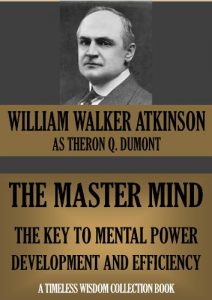In this book there will be nothing said concerning metaphysical theories or philosophical hypotheses; instead, there will be a very strict adherence to the principles of psychology. There will be nothing said of ''spirit'' or "soul''; but very much said of "mind." There will be no speculation concerning the question of "what is the soul," or concerning "what becomes of the soul after the death of the body." These subjects, while highly important and interesting, belong to a different class of investigation, and are outside of the limits of the present inquiry. We shall not even enter into a discussion of the subject of "what is the mind"; instead, we shall confine our thought to the subject of "how does the mind work."
For the purposes of the present consideration of the subject before us, we shall rest content with the fundamental postulate that "Every man or woman has a mind," and the corollary that when an intelligent man or woman speaks of "myself," he or she is conscious that his or her "mind" has a more intimate relation to that "self" than has his or her "body.'' The ''body" is usually recognized as "belonging to" the "self," while the "mind" is usually so closely identified with the "self" that it is difficult to distinguish them in thought or expression.
Many philosophers and metaphysicians have sought to tell us "just what" the mind is; but they usually leave us as much in doubt as before the so-called explanation. As the old Persian poet has said, we usually "come out the door in which we went," in all such discussions and speculations concerning the nature of mind, or "just what mind really is." We can, and do, know much about how the mind works, but we know little or nothing about what the mind really is. But, for that matter, so far as practical purposes are concerned, it makes very little difference to us just what the mind is, providing we know just how it works, and how it may be controlled and managed.
For the purposes of the present consideration of the subject before us, we shall rest content with the fundamental postulate that "Every man or woman has a mind," and the corollary that when an intelligent man or woman speaks of "myself," he or she is conscious that his or her "mind" has a more intimate relation to that "self" than has his or her "body.'' The ''body" is usually recognized as "belonging to" the "self," while the "mind" is usually so closely identified with the "self" that it is difficult to distinguish them in thought or expression.
Many philosophers and metaphysicians have sought to tell us "just what" the mind is; but they usually leave us as much in doubt as before the so-called explanation. As the old Persian poet has said, we usually "come out the door in which we went," in all such discussions and speculations concerning the nature of mind, or "just what mind really is." We can, and do, know much about how the mind works, but we know little or nothing about what the mind really is. But, for that matter, so far as practical purposes are concerned, it makes very little difference to us just what the mind is, providing we know just how it works, and how it may be controlled and managed.






